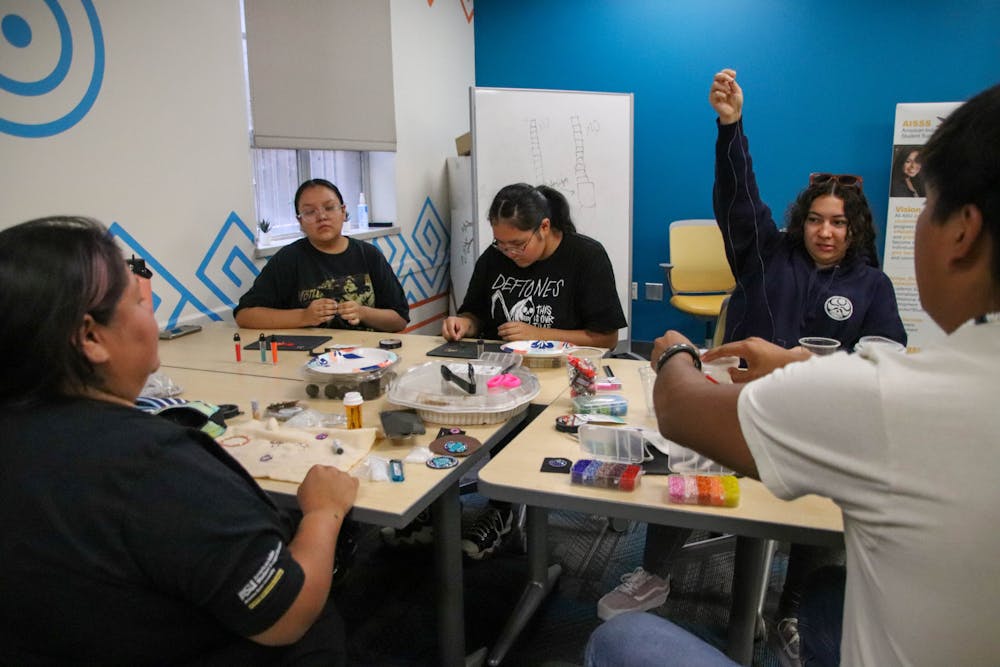As hints of tobacco and sage seep into the hallways, out the windows and through the doors, a feather rests in the hands of a student sitting in a smudge circle – a spiritual ceremony where participants center themselves through expressive emotion shared with others.
A heavy feeling fills the air, as the intention of the smudge circle is to encourage vulnerability among the students.
Though November is National Native American Heritage Month, Indigenous culture is celebrated and traditions are practiced daily at ASU through events such as the weekly Talking Circle hosted through October and November.
"I smelt cedar when I walked into the door of Discovery Hall," Lakota Kinlicheenie, a junior studying communications, said. "It just felt like home and something so mesmerizing. It takes me back to being with family."
ASU provides American Indian Student Support Services space on all four Valley campuses to support Indigenous students and honor the tribes around the area and the land used by the University.
"Every day is Indigenous people day," Laura Gonzales-Macias, associate director of AISSS, said.
Advocates, or those who work and participate in AISSS, provide students with everything from desktops to smudge circles to spaces for meditation.
"AISSS provides services to all Indigenous students to ensure they will successfully progress towards educational excellence and graduate to become self-reliant individuals who effectively give back to their families and communities," according to its website. "We provide warm, inclusive spaces which students like you have affectionately named 'home away from home."
AISSS has representatives from all 22 federally recognized tribes in Arizona.
"The stuff that really impacts students here would be seeing them visible here in different spaces," Napolean Marrietta, a graduate student studying public administration, said. "That is where AISSS comes (through with) academics, financial aid and things of that nature."
READ MORE: Organization promotes Indigenous social work through community building, training
President George H.W. Bush declared November National American Indian Heritage Month in 1990. Several other cultural heritage months were signed into law in the following year.
"It doesn't matter how many events we have," Marrietta said. "We just want the knowledge, education, heritage and culture to be there."
Multiple student groups take advantage of the month and host events to spread knowledge and awareness of the 574 federally recognized Indigenous tribes across the U.S.
"Even though they feel alone in class, at least they know outside of class they can have that support," Marrietta said. "Whatever it is they are going through, anything that they may need, or support as far as mental health, there is always a department there for Indigenous students to feel welcome."
Through a partnership with local tribes, ASU's land acknowledgment plays at events and is posted around University campuses and placards to pay respect to the importance of Indigenous culture and its impact on ASU.
"From ancestral to now, I see our lands," Marrietta said. "Everybody has a place of origin, and their stories tied to the land. For me, it's always walking in those footsteps."
Stressing the importance of identity, Gonzales-Macias said students should focus on not letting others stereotype their cultures and identity.
"They define themselves," Gonzales-Macias said.
On Nov. 30, a screening of "Imagining the Indian" will take place at Marston Exploration Theatre from 5:30 to 8 p.m. The screening is meant to start conversations between Native Americans and the public about the renaming of mascots and teams – such as the now Washington Commanders – to not offend the Indigenous community.
"It's about asking the bigger questions of why," Marrietta said.
Working nonstop, advocates in AISSS have created mixers to help connect students with other Indigenous-supporting organizations. During this year's heritage month, the Indigenous student organizations hosted events to celebrate art, careers and traditions from represented tribes.
On Nov. 8, the AISSS partnered with Handshake, an online job search engine many universities use, to create a filter option that allows users to find tribal-based organizations.
Gonzales-Macias said many students want to go back and give back to their communities after college. AISSS is a safe place where students can "grow in identity" and "safely explore that," Gonzales-Macias said.
The mix of student backgrounds allows for connection over newly learned or practiced traditions in Discovery Hall, which has spaces to meditate, connect through smudge circles and bond with other advisors.
"Don't be afraid to ask questions; you might assume the wrong things," Marrietta said. "People should look to people who know the spaces and will talk to you about things (if you) want to gain knowledge."
Correction: A previous version of this article said the screening of "Imagining the Indian" would take place at the Madison Center for the Arts. The screening of the film will take place at the Marston Exploration Theatre on the ASU Tempe campus. This story was updated on Tuesday, Nov. 21, at 10:25 a.m. to reflect the changes.
Edited by Grey Gartin, Walker Smith and Sadie Buggle.
Reach the reporter at glmcfar1@asu.edu and follow @ginia_mcfarland on X.
Like The State Press on Facebook and follow @statepress on X.
Ginia is a junior studying journalism and mass communication with a minor in criminology. This is her third semester with The State Press. She has also worked at Arizona Capital Times and KTAR News.




